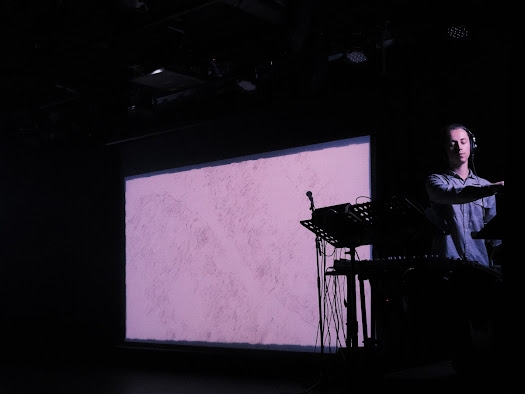John Lost is the moniker of Montreal-based producer, John Buck. A jazz drummer by training, a dance accompanist by trade, and a producer by craft, he proposes a compelling beat music that blends these three elements. Hot on the heels of his first release, Train to Kansai, we spoke to John Lost to see if he’s found himself yet with this music.
PAN M 360 : John, thanks for being here and congratulations on Train to Kansai. Is releasing your first record as glamorous as it sounds?
John Lost : Ha, who says it’s glamorous? I mean, not really. Perhaps if you have a following already. But sometimes when I’m out, I want to listen to one of my tunes and I can put it on. The fact that I enjoy it as a listener and feel like it sounds good—that’s reward enough.
PAN M 360 : And of course other people too, who do manage to find it.
John Lost : Yeah. A few people have made comments. A couple of friends reached out and said, “I listened to the record, and this was my favourite tune.” That’s cool. I joke, “Good, I’m collecting data on what the most popular tunes are.” But everyone has said something different. When I played it for friends the other night, I got the sense that “SUNSHWR” hit the most. But those were a bunch of jazz musicians. Then my friend Jean-Michel said he liked “…take me back” the best. Someone who isn’t a musician but knew me from a dance class liked “J-10” the most. So it’s like, okay, that’s probably a good sign.
PAN M 360 : Well that’s no surprise, certainly there’s a lot going on in this record. I like the name “Train to Kansai” because this music definitely takes you on a trip and it traverses some very interesting sonic terrain. There’s electronica, some jazz, some rock. You can dance to it, you can cry to it. I haven’t quite heard a record like this, the blend of electronic music and acoustic music is really well executed. You made electro-acoustic music in the end.
John Lost: Yeah, I wasn’t sure whether to lean more on the acoustic or the electronic side. Although, I mean, electro-acoustic music that means a whole different thing. Nothing against people who make that music, but it’s the opposite of what I’m trying to do in some ways. I like the sounds, but the focus is on making tunes with grooves and melodies that hit people physically. Electroacoustic music can sometimes be light on musical fundamentals like harmony, groove, and melody. That’s what I love about music—those three things. The electronic and acoustic marriage was one of the most difficult parts. Each track felt like going back to the drawing board because there was always a question of how electronic versus acoustic it should be.
PAN M 360 : So, was the process intensive?
John Lost : Yes, very. For example, in “SUNSHWR,” the melody is both saxophone and synthesiser. The idea was to make that sound like one instrument. It required a lot of precision in editing. Will I do that again? I don’t know, but it was intense for sure.
PAN M 360 : As your first record, do you feel it was an appropriate statement for you? Sometimes it takes a long time for a record to be released, and in that time, you could have changed your perspective on things.
John Lost : It took me over three years, and a lot has changed in the music I listen to and make now. With the first album, it’s the culmination of my relationship with music since I was 13. That’s why it came out fairly diverse in tempo and style. Is it reflective of what I’m doing now? Some of it, yeah.
There is a division on the record because a few tunes were written with a more jazz approach, focusing on melody and bassline first. Some came out of dance class improvisations, like “SUNSHWR” and “Healing.” Those were written on drum machines, starting with loops, which is central to the music I’m doing now in live performances.
PAN M 360 : Well even though you move through this sonic terrain, the mood of the album is generally kind of consistent. It’s not the most joyful train ride, shall we say.
John Lost : You’re not the only one to tell me that. People are telling me that it’s melancholic. You’re not the only one to tell me that. My friend Roman said it was like “a sad robot on a beach.”
PAN M 360 : Ha, I wouldn’t go that far, but certainly it has a very cinematic quality and an almost cyberpunk aesthetic, for me at least.
John Lost : Wow, I like that. Anytime my music conjures a specific image for people, that’s cool. Cinematic—a lot of people have said that.
PAN M 360 : Was it inspired by your travels there?
John Lost : Oh yeah, I went to Japan in 2019, right before the pandemic. I took the train from Tokyo to Kyoto, then from Kyoto to the airport in Osaka Bay. At night, I saw the city pass by, then suddenly the scene changed to a black expanse over the water. It was almost James Bond-esque. Japan feels like you’re 25 years in the future. That experience informed the music.


PAN M 360 : Could your album be performed live, or was it mostly a studio endeavour for you?
John Lost : It can be performed live. The tracks from dance class improvisations are the ones I often choose to perform live. The performance practice is different than the arrangements on the record. My live goal is more dance floor focused, with cyclical sections and texture adjustments to create forward momentum.
I did an album launch last summer, a year before the album was ready. That was like a constant in the preparation of the record—it took longer at every stage than I thought. The mixing was a lot of trial and error. But yes, I did the launch with a different gear setup than I’m using now. With the electronic world, there’s not as much convention, so it’s been about learning which instruments feel natural to me and how to adjust the performance practice.
PAN M 360 : Your project as John Lost is really interesting in that respect, in how it navigates different styles and performance practices. Is that something you think about, where exactly your niche is?
John Lost : That’s actually a challenge with marketing this album. It’s hard. When streaming platforms ask for the genre, “Lost and Found” is kind of rock with a jazz spirit but cyclical and loop-based. “J-10” is a straight-up house beat with a string breakdown. I’m still figuring out how to market it. Some people might like one track but not another based on tempo or use.
PAN M 360 : In those cases, the artist can become the genre so to speak. But It’s hard in the beginning without the following. It reminds me of producers like Floating Points, who also have a great love and appreciation for acoustic music but are equally comfortable performing a dance set at a club.
John Lost: or working with an orchestra for ballet! I definitely take inspiration from artists like Floating Points. I don’t have to decide to be just one thing. I can create music that feels natural and captures a period of time. The next album will capture something different. I don’t consider the marketability when creating, but live performance encourages me to make music that works. This first record was more about finding myself as a writer.
PAN M 360 : Is there a particular way you want to describe John Lost?
John Lost: In the act of creation, we can lose ourselves, abandoning self-consciousness and fully engaging as a conduit for music. That’s proof that there’s something bigger than just humans. Musicians can act as a conduit for that feeling. John Lost embodies losing oneself in music.
PAN M 360 : How poetic! Tell us what’s next for you.
John Lost: I’m going to Banff for an artist residency next month, doing some improvised dance music after a jam session. I’m working on a gig in late August with my friend Jacob, who’s doing music for contact improvisation dance. I’m also working on a self-produced concert series in Montreal for 2024, inviting guest artists to split the bill.
PAN M 360 : Sounds like there’s a lot of dancing involved.
John Lost: Yeah, that’s the idea, always the idea.
PAN M 360 : Thank you, John.
























